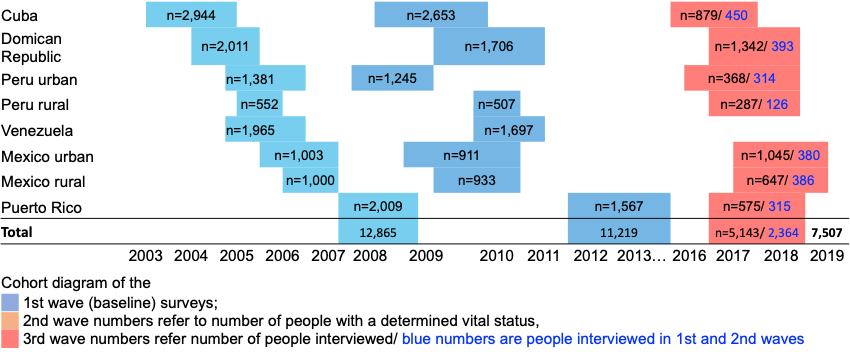
The 10/66 Dementia Research Group
The 10/66 Dementia Research Group (DRG10/66) is a collective of researchers carrying out population-based research into dementia, non-communicable diseases and ageing in low- and middle-income countries.
The DRG10/66 Group 1066 conducts epidemiological research program which consists in a population-based study comprising all older residents aged 65 years and over, living in geographically defined catchment area sites in low- and middle-income countries. The 10/66 research program was developed to address dementia prevalence, incidence, and impact across countries, using a validated and standard methodology. Given that the program implemented by the Dementia Research Group 1066 (DRG10/66) has become a population-based cohort study, the scope of the research is now much broader and entail a comprehensive inquiry into health (common and burdensome chronic diseases, disability and health service utilization) and social aspects of aging (socioeconomic status, social protection, needs for care and care arrangements). The 10/66 DRG protocols also included a neurological disease assessment and a physical and neurological exam. All interviewers and field examiners received uniform and standardized training.

The 10/66 group has led the first and largest longitudinal population-based dementia study in Hispanics, expanding from the Caribbean (Cuba, Dominican Republic and Puerto Rico) to North-Central America (Mexico) South America (Perú, Venezuela), and China. Each of these centers have used the same design (a comprehensive one-phase survey of all residents aged 65 and over) and cross-culturally validated assessments (dementia diagnosis, mental disorders, physical health, demographics, extensive non-communicable disease risk factor questionnaires, health service utilization and caregiver strain). After three consecutive waves, the 10/66 studies have provided a unique resource of directly comparable data, comprising approximately 20k unique elderly people from LMIC. DRG 10/66 is the brainchild of Prof. Martin Prince, who is one of the world's foremost researchers in the field of dementia epidemiology.

The name “10/66” refers to the two-thirds (66%) of people with dementia living in low- and middle-income countries, and the 10% or less of population-based research that has been carried out in those regions.
